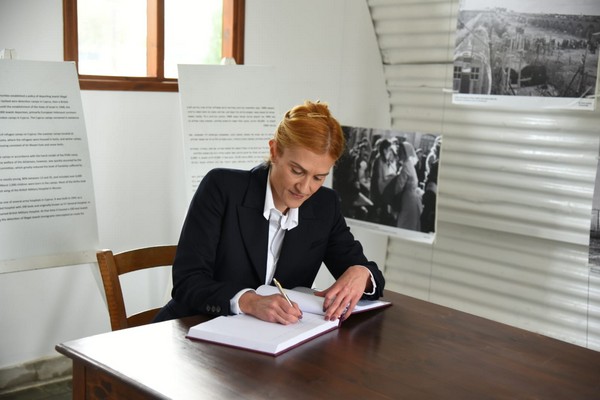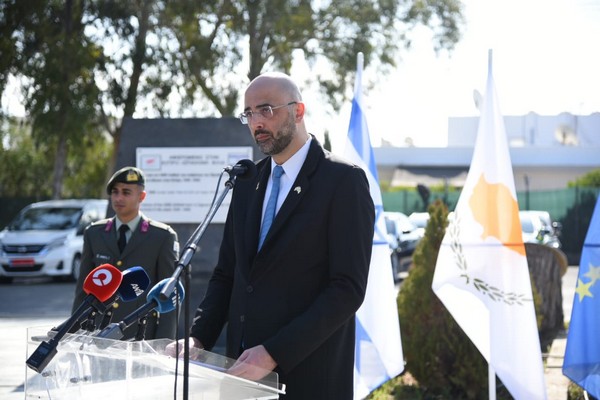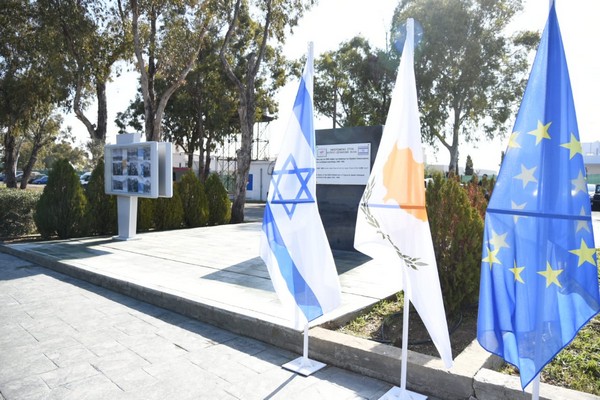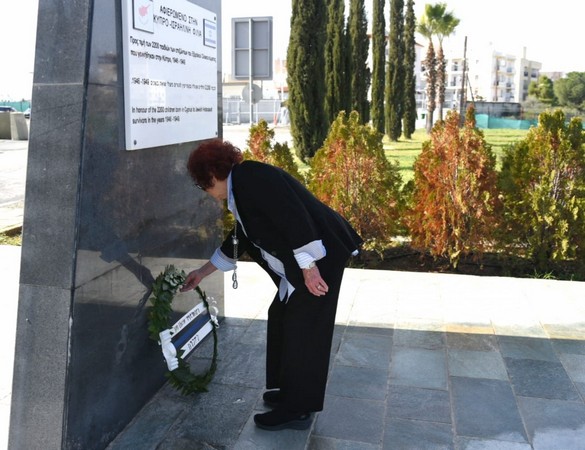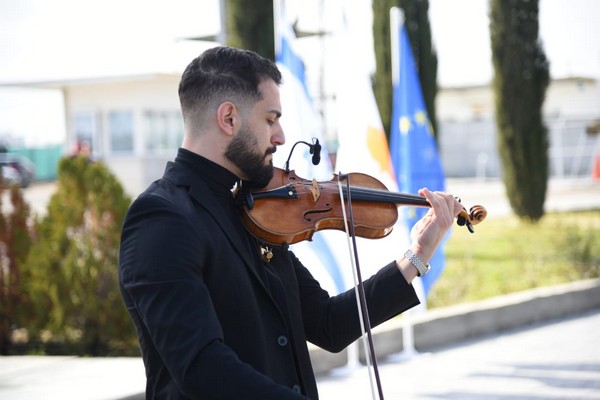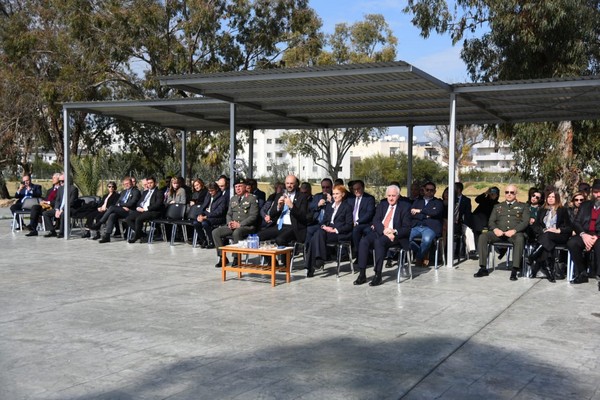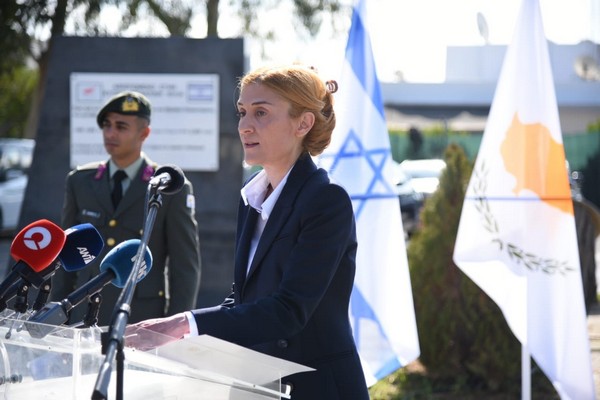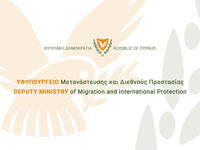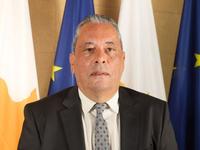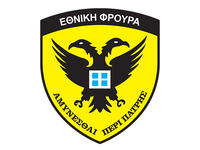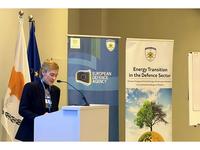Press Releases
18-02-2025 14:01
Welcome speech by the Acting Permanent Secretary of the Ministry of Defence, Ms Anna Aristotelous, at the commemoration event for the 76th anniversary since the closure of the detention camps for Jewish Holocaust Survivors in Cyprus
I have the honour of delivering this speech on behalf of the Minister of Defence of the Republic of Cyprus, Mr Vasilis Palmas, who, unfortunately, due to prior obligations that could not be postponed, was not possible to attend in person. It is a privilege to convey his message on this solemn occasion.
With profound respect and deep emotion, I welcome you today to the Monument of Cyprus-Israel Friendship, a tribute to the children of Holocaust survivors born in Cyprus between 1946 and 1949, symbols of resilience, survival, and hope. This year, we commemorate the seventy-sixth anniversary of the closure of the British detention camps in Cyprus, where thousands of Jewish Holocaust survivors were transferred and held, enduring a critical yet often overlooked chapter of their journey toward homeland.
During and immediately after the Second World War, Cyprus served as an intermediate refuge for thousands of Jewish survivors seeking to reach their homeland. The operation of these detention camps between 1946 and 1949 remains one of the most defining yet-lesser-known chapters in the history of Jewish immigration to this island. Over fifty thousand displaced individuals, having endured the horrors of the concentration camps, arrived in Cyprus with one unwavering aspiration; to rise from the ashes and rebuild their lives with dignity, peace, and security. The systematic extermination of millions of Jews during World War II, coupled with the antisemitic policies of various governments and the reluctance of numerous nations to grant asylum to Jewish refugees, underscored the imperative need for the establishment of a Jewish state, a state that would provide a sanctuary for displaced Jewish populations and ensure their rightful recognition within the international community.
On their path to their new homeland, Cyprus became a temporary haven for these survivors, offering them security and care in a world that had so often denied them both. The response of the Cypriot people to this humanitarian crisis was immediate, profound, and heartfelt. From 1946 until the closure of the last camp in February 1949, Cypriots extended compassion and solidarity, offering invaluable support, comfort, and assistance to the Jewish detainees housed in the British detention camps of Caraolos, Famagusta, Xylotympou, and Dhekelia.
During this period, 2,200 children were born in Cyprus. Some of them may be with us today, honouring this solemn occasion. Their existence and presence here are a testament to the resilience of the human spirit. Their perseverance in the face of extreme hardship stands as a powerful reminder that even in the darkest of times, humanity can triumph over oppression and injustice. Amid one of the darkest and most tragic periods in human history, these survivors restored hope to a world that had nearly lost it. Their experiences serve as a poignant reminder of the boundless capacity of the human spirit to withstand and overcome even the gravest of adversities.
Eighty years have passed since the liberation of the Nazi concentration camps. Yet, it remains inconceivable that such an abhorrent chapter in human history was ever conceived, let alone executed. The establishment and operation of these camps exemplified the systematic and “industrialised” strategy devised by the Nazi regime and its collaborators to eradicate the Jewish population of Europe, along with other groups deemed subhuman and “undesirable”.
The story of the thousands of Jews who managed to escape from Europe serves as a sombre testament to modern history. It is incumbent upon us to preserve and disseminate their testimonies, ensuring that they are transmitted to present and future generations. Our presence here today is a solemn tribute to remembrance and reflection. We must remain steadfast in our commitment to preserving historical memory, for it is an integral component of our collective history.
This key message was eloquently articulated by the Director of the Auschwitz Museum in his recent speech, commemorating the 80th anniversary of the camp's liberation, a solemn ceremony at which the Minister of Defence of the Republic of Cyprus, Mr Vasilis Palmas, had the great honour of representing the President of the Republic of Cyprus.
Memory, he stressed, is a force that “hurts, but it helps, guides, warns, sensitises, and obliges” us to resist repeated mistakes and preserve our humanity. Memory is not just a means of understanding history; it is a moral compass that shapes our present and safeguards our future. It reminds us of the consequences of intolerance and hatred, and compels us to stand against racism, antisemitism, and discrimination in all its forms.
We must remain resolute in our efforts to preserve it, not only as a lasting tribute to the victims but as a moral imperative that guides us toward a world founded on the principles of humanity, solidarity, and peace. The message of today’s commemoration is clear: every human life is of equal value and must be protected. We have a duty to ensure that the memory of the Holocaust is preserved, serving as a guide for the future.
Drawing strength from history, we must firmly stand against all forms of violence, antisemitism, social inequality, intolerance, and discrimination. We must work tirelessly for a world where peace, reconciliation, collaboration, and respect for human dignity prevail.
I sincerely thank you all for attending this solemn event and for your kind attention.
(MS/GS)
